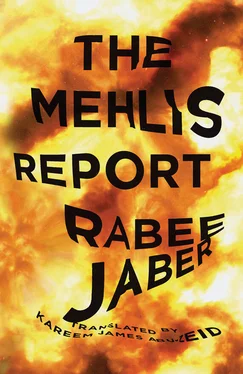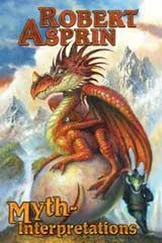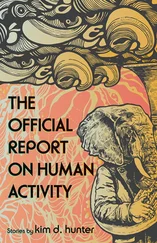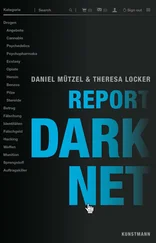A day later he was reading other things in the paper. He read that cats were leaving the dark crime scene, which was fenced in with steel barricades painted in black and white. The cats were coming in under the barricades and yellow police tape. The rifles and machine guns could not stop them from coming and going as they pleased. They came in lightly, but left with full bellies. Saman read that the people in Mina al-Hosn and Ain al-Mreisseh could hear the cats fighting and meowing wildly at night. A woman saw a cat outside her kitchen window carrying a human hand in its teeth. The woman was very upset. A family — a woman and her brother and three daughters — fought with the police and managed to get into the off-limits area. A fact-finding commission headed by Peter FitzGerald, an Irish UN delegate, was taking samples from the crime scene just then. Men wearing white masks and white gloves were kneeling in the burnt black earth, between the chunks of asphalt, and taking samples from the soil. At that very moment the family descended on the place. A foot, naked, could be seen sticking out of the debris. The shoe had been burnt off, as had the sock. Were you, weeping woman, really the first to see that foot there? They found a telephone, its batteries dead, in the hand of the man who’d been left behind.
I want to tear up what I’ve written. Why do I write about such horrific things? Saman can read about them in the paper. That same family, the family of the man who was killed because he happened to be passing by that spot at that precise minute at midday on February 14th, that same stricken family had read about it in the papers and seen it all on TV. Should I tear up what I’ve written? I saw them sitting in their tall house, among the furniture bought by the father, sitting in that home that overlooks the Manara corniche; I saw them talking and weeping. I saw the oldest daughter, and the youngest. I saw them and thought of my family. I saw them and did not cry. Why didn’t I cry right then? From the house’s balcony they could see the Ain al-Mreisseh Mosque and the statue of Gamal Abdel Nasser, and the McDonald’s, and the Vendôme Hotel, and the black ghost of the Saint Georges. From there they could see the white ambulances with red crosses or red crescents painted on their doors. From there they could see the red fire trucks and civil defense vans. From there they could see the black debris. And from there they had seen, a little while ago, the fire and smoke. The father had gone out to walk around a bit. He left and did not return.
I want to tear up what I’ve written, but tearing up pages is forbidden: it’s a strict law in the land of the dead. Everything that’s written down is kept in the archives. Tearing up paper is forbidden. After a long time has passed — and if no one asks to see the pages — it’s possible to clean them with a special substance, so that the pages turn white again. But tearing them up is absolutely forbidden. The letters swarm like insects on the page, but it’s forbidden to burn them. I want to burn them. But I can’t.
Saman is up late too. I start to feel tired, so I turn on the TV for a moment and see him on the sofa, still wearing his pants, with his head on the headrest. Why doesn’t he take off his clothes and put on his pajamas? Why doesn’t he relax? A news ticker is on the TV in front of him: The al-Aqsa Martyrs’ Brigade has taken up. The occupation forces have assassinated. The number of victims of the Pakistan earthquake has risen to 53,000 dead. The American army says that five of its soldiers have. Migrating fowl have spread Avian Bird Flu from Turkey to Syria. The percentage of people who have rejected the constitution in Samarra alone has reached. A mass grave containing victims from the Srebrenica massacre has been discovered in Bosnia. Britain has warned of. Morocco has accused Algeria and the Polisario Front of attempting to. A women’s demonstration in the Belgian capital. Solidarity with. Four Israeli settlers were killed. The al-Aqsa Martyrs’ Brigade has taken up. And the ticker starts over from the beginning. It’s gone through a full cycle, and Saman is still reading the bylines. Is he even aware he’s reading those words?
The first time they took me to the library I stood between the long rows, among the bookcases and shelves and corridors — I stood there not knowing what to do. How could I read all these books? It’s impossible, I said, I couldn’t read all these books in a hundred years.
You’ve got more than a hundred years, they replied. And it’s not necessary to read all the books. The important thing is that you read.
They took me to the depths of the library. There, in its depths, the old books could be found. There were countless tables, and people spread out among them. The books were open on the tables, beneath green lamps, and men and women were engrossed in reading. Their faces were swimming in other worlds, and sometimes they’d forget to move and their limbs would fall asleep. Once one of them got up to fill his cup at the water cooler and had to brace himself on the tables to keep from falling over: a lovely feeling, as if ants were crawling through his leg, that tingling in the leg and hand from sitting for so long. A woman at another table pushed away her book and got up to walk over to the window, steaming it up with her breath. She looked at the trees and the sky and the clouds. A patch of sea appeared through the trees, a blue patch glistening with sunlight: white dots like silver, yellow dots like gold. I saw tears in her eyes. What was she remembering? What was she thinking at that moment? Her hair was red, her face freckled. She had freckles on her shoulders and back as well. She was wearing a sleeveless blouse. Her shoulders were round. A man at another table lifted his head from a book and looked at her. Her blouse, as white as her skin, had blood-red flowers on it. Her pants were white too. She wasn’t overweight, but that man was looking at her as if she were. As if she were fat. I know how men look at women.
The depths of the library, where the old books are found, are teeming with readers. The dead know their books. But no one here reads any new ones. The overseer of the library, who always helps me find what I’m looking for, says new books are unnecessary. As he drinks some water, he tells me there are two kinds of new books: the first kind are not good; and the second kind are. The second kind are rewritings of old works. The first kind strive to be new, to not imitate the old, and these are generally written by people who don’t like to read — they say they like to read, but in truth they don’t.
“People who like reading don’t write,” states the overseer. “People who like reading don’t waste their time writing. Why should they write? They’ve got all these books to read.”
I look at his young white face — it’s as if this man were just a boy — and tell him I’ve come to love reading since I’ve been here, but that I still love to write anyway.
That’s not the same, he says, for I’m no longer in the land of the living. He’s talking about the new books written over there. He also remarks that I’m still quite argumentative.
“People who like reading don’t waste their time writing or being argumentative — they just sit down and read.”
He takes pleasure in repeating his sentences. Whenever he likes the way words fall on his ears, he repeats them. As if he’s not talking to me. As if he’s talking to himself.
His self-confidence bothers me — his appearance might have something to do with how much he annoys me. If he were an old man, I’d probably accept his words. But he looks like a boy.
Someone might get bored of reading, I tell him, and while he always says the good books are the old ones, not all the old ones are good, which means that there aren’t all that many good books and it’s possible for someone to read all of them. After that, what would that person do? After he finished reading everything, couldn’t he start writing? He’s finished all the good books, I say, so what should he do next?
Читать дальше












